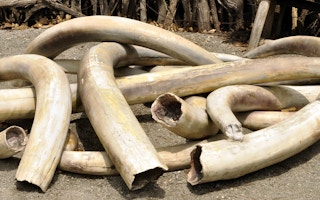Although public support for a ban on elephant ivory in Singapore is almost universal, the government has yet to introduce a moratorium on the sale of the endangered species.
To continue reading, subscribe to Eco‑Business.
There's something for everyone. We offer a range of subscription plans.
- Access our stories and receive our Insights Weekly newsletter with the free EB Member plan.
- Unlock unlimited access to our content and archive with EB Circle.
- Publish your content with EB Premium.
A public consultation on outlawing the sale of ivory was completed in December 2018, with 99 per cent of Singaporeans saying they backed the ban, it was revealed in Parliament yesterday.
But six months on, a ban on the sale and display of ivory has yet to be made law.
Speaking in Parliament yesterday, environmentalist turned politician Louis Ng asked the Minister for National Development, Lawrence Wong, for an update on the public consultation, which was launched in November last year.
“The public consultation on the proposed domestic ivory ban was completed in December 2018. 99 per cent of respondents supported the ban. NParks [National Parks Board] is evaluating the feedback and will announce the details of the ban soon.”
Singapore banned the international trade in elephant ivory in 1990, but still permits the local sale of ivory if vendors can prove that their products were imported before 1990, or were acquired before elephants were categorised as an endangered species by Convention on International Trade in Endangered Species of Wild Fauna and Flora (CITES).
A ban on ivory was raised in Parliament more than two years ago, and then the government said the same thing—that a ban was in motion, but details of the implementation were still being worked out.
A roaring trade
The conversation about the ivory trade in Singapore made headlines in August last year, when a fake ivory store set up by green group World Wide Fund for Nature (WWF) stirred emotions on social media.
WWF’s campaign aimed to remind Singaporeans that the sale of ivory is still legal in the city-state, and revealed that around 40 stores still sell the animal part, mainly in the district of Chinatown.
China, the world’s biggest source of demand for ivory, banned its sale in 2017, while Hong Kong—the world’s largest ivory market—has opted to gradually phase out the sale of ivory, with a moratorium to be introduced by December 2021.
Singapore’s proposed ban also includes a grace period of up to three years for ivory sellers to decide what to do with existing stocks. Madhu Rao, senior regional advisor and Singapore representative for Wildlife Conservation Society commented that the grace period is “too long,” and could be reduced to 1.5 years.
“Such a long grace period creates significant enforcement challenges. Since the Government of Singapore announced this consultation, traders already have sufficient opportunity to be aware of the pending closure of the domestic ivory market in Singapore,” she said in response to the public consultation last year.
She also suggested that vendors should register their existing inventory of ivory by law during the grace period, and that law enforcement should be strengthened at customs to deter attempts to smuggle ivory. “It is vital that Singapore show the world how effective its enforcement can be,” she said.
Elephant numbers have dropped by 62 per cent over the last decade, and the species is expected to be extinct in the wild within a decade at the current rate of poaching, driven by demand for ivory in Asia.










